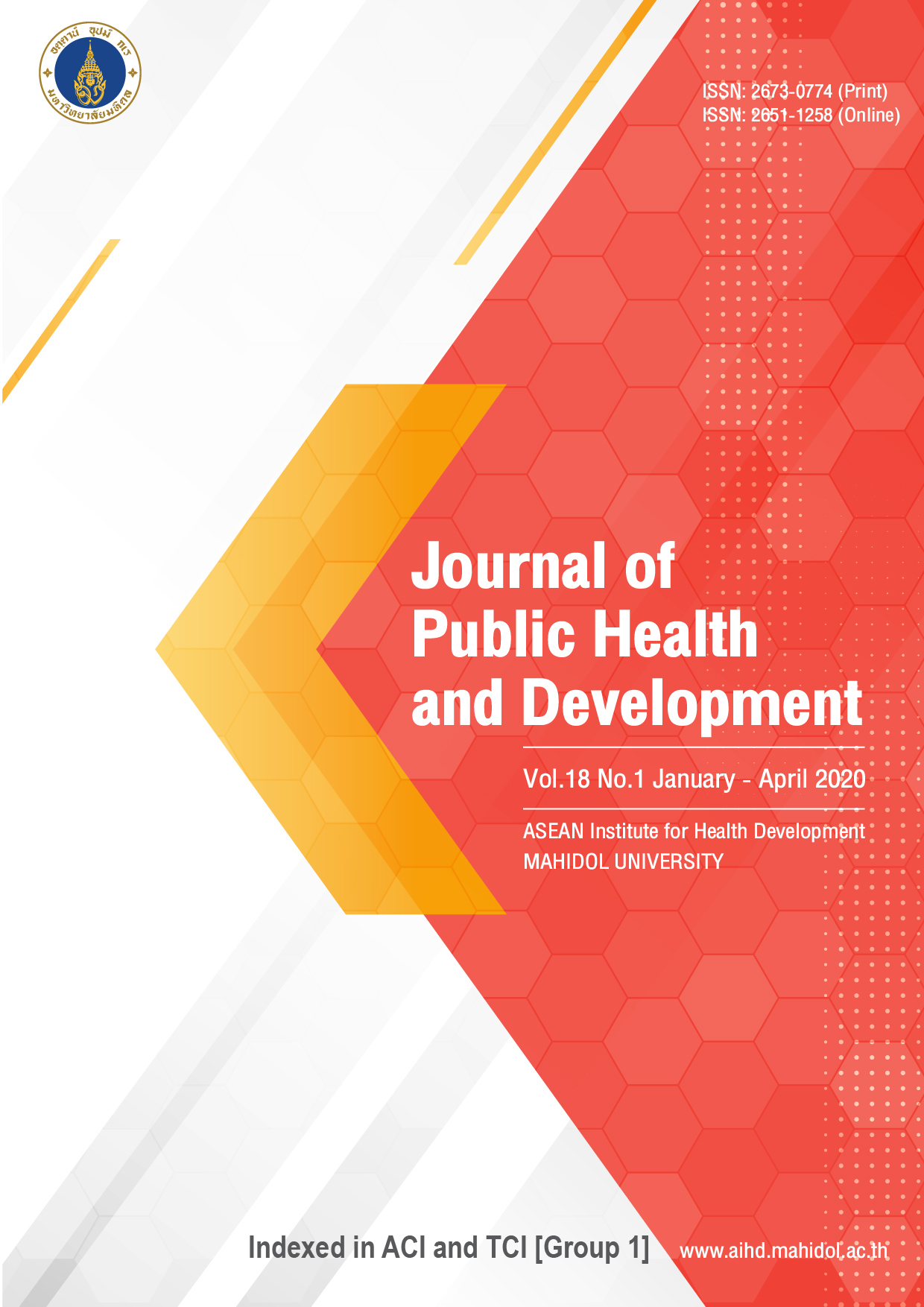The effectiveness of the dental health education program on children from 2 to 5 years and their caretakers in Ratchaburi Province, Thailand
Main Article Content
Abstract
It is the most common oral disease in several Asian and Latin American countries. In Thailand, the burden of dental caries is still high despite significant efforts and contributions to public health prevention programs for dental health.The objective of this quasi experimental research was to investigate the effectiveness of dental health education programs on the dental caries status in 2 to 5 years children living in Ratchaburi Province, Thailand. Quasi-experimental study design was used with routine group (n = 84) and treatment group (n = 205). Total sample size was 289. The routine group received routine dental health education and for the treatment group, comprehensive dental health education program for 6 months duration with initial and post measurements. Questionnaires were distributed to caretakers, and dental health examinations of children were completed by three well-trained expert dentists using the WHO dmft index for dental cares condition. Standard check list form prepared by WHO dentist international experts was used to diagnose the caries status outcomes, standard structure questionnaire was used to identify caries knowledge, oral hygiene and feeding practices in preschool children.
The data were analysed using descriptive statistics, chi-square tests and independent t-tests. Dental caries prevalence was 73.2% in the treatment group and 52.4% in the routine group. The mean of the dental caries occurrence in the routine group (3.49 ± 4.818) was statistically less (p < 0.05) than that of the treatment group (4.96 ± 4.968). Even though there was no significant difference, the treatment group had higher dental caries knowledge and feeding practices and the routine group had healthier oral hygiene practices. In sum, the findings suggest that a comprehensive dental health education program needs to continue particularly for children and whole family members with a longer duration of intervention.
Article Details
References
WHO. WHO. Oral Health Status Fact Sheet, https://www.who.int/oral_health/ publications/factsheet/en/ (2012).
Petersen PE, Hunsrisakhun J, Thearmontree A, et al. School-based intervention for improving the oral health of children in Southern Thailand. Community Dental Health 2015; 32: 44-50. Article. DOI: 10.1922/CDH_3474Petersen.
Pine C, Adair P, Robinson L, et al. The BBaRTS Healthy Teeth Behaviour Change Programme for preventing dental caries in primary school children: study protocol for a cluster randomised controlled trial. Trials 2016; 17: 103. journal article. DOI: 10.1186/s13063-016-1226-3.
Bönecker M, Abanto J, Tello G, et al. Impact of dental caries on preschool children's quality of life: An update*. Brazilian Oral Research 2012; 26: 103-107. DOI: 10.1590/S1806-83242012 000700015.
Azevedo MS, Romano AR, Correa MB, et al. Evaluation of a feasible educational intervention in preventing early childhood caries. Brazilian oral research 2015; 29: 1-8.
Basir L, Rasteh B, Montazeri A, et al. Four-level evaluation of health promotion intervention for preventing early childhood caries: a randomized controlled trial. BMC Public Health 2017; 17: 767. RCT.
Faustino-Silva DD, Meyer E, Hugo FN, et al. Effectiveness of Motivational Interviewing Training for Primary Care Dentists and Dental Health Tech-nicians: Results from a Community Clinical Trial. J Dent Educ 2019; 83: 585-594. 2019/03/13. DOI: 10.21815/ JDE.019.063.
Hashmi S, Mohanty VR, Balappanavar AY, et al. Effectiveness of dental health education on oral hygiene among hearing impaired adolescents in India: A randomized control trial. Spec Care Dentist 2019; 39: 274-280. 2019/04/10. DOI: 10.1111/scd.12374.
Salama FS and Al-Balkhi BK. Effecti-veness of educational intervention of oral health for special needs on knowledge of dental students in Saudi Arabia. Disabil Health J 2020; 13: 100789. 2019/09/10. DOI: 10.1016/ j.dhjo.2019.03.005.
Smith L, Blinkhorn F, Moir R, et al. Results of a two year dental health education program to reduce dental caries in young Aboriginal children in New South Wales, Australia. Commu-nity Dent Health 2018; 35: 211-216. 2018/08/17. DOI: 10.1922/CDH_4293 Smith06.
Stein C, Santos NML, Hilgert JB, et al. Effectiveness of oral health education on oral hygiene and dental caries in schoolchildren: Systematic review and meta-analysis. Community Dent Oral Epidemiol 2018; 46: 30-37. 2017/08/ 18. DOI: 10.1111/cdoe.12325.
Villanueva-Vilchis MDC, Alekseju-Niene J, Lopez-Nunez B, et al. A peer-led dental education program for modifying oral self-care in Mexican children. Salud Publica Mex 2019; 61: 193-201. 2019/04/09. DOI: 10.21149/ 9273.
Social and behavior theory e data base [cited 4 July 2017]; Available from https://obssr.od.nih.gov/wp-content/uploads/2016/05/Social-and-Behavioral-Theories.pdf.
WHO. Oral health surveys: basic methods. World Health Organization, 2013.
Manchanda K, Sampath N and De Sarkar A. Evaluating the effectiveness of oral health education program among mothers with 6-18 months children in prevention of early childhood caries. Contemporary clinical dentistry 2014; 5: 478.
van der Tas JT, Kragt L, Elfrink ME, et al. Social inequalities and dental caries in six-year-old children from the Netherlands. Journal of dentistry 2017.
Mohebbi S, Virtanen J, Vahid-Golpayegani M, et al. A cluster randomised trial of effectiveness of educational intervention in primary health care on early childhood caries. Caries research 2009; 43: 110-118.
Peltzer K, Mongkolchati A, Satchaiyan G, et al. Sociobehavioral factors asso-ciated with caries increment: a longi-tudinal study from 24 to 36 months old children in Thailand. Int J Environ Res Public Health 2014; 11: 10838-10850. DOI: 10.3390/ijerph111010838.
Jiang EM, Lo EC, Chu CH, et al. Prevention of early childhood caries (ECC) through parental toothbrushing training and fluoride varnish application: a 24-month randomized controlled trial. Journal of dentistry 2014; 42: 1543-1550. RCT 2014/12/03. DOI: 10.1016/j.jdent.2014.10.002.
Huebner C and Milgrom P. Evaluation of a parent-designed programme to support tooth brushing of infants and young children. International Journal of Dental Hygiene 2015; 13: 65-73. Article. DOI: 10.1111/idh.12100.
Aljafari A, Gallagher JE and Hosey MT. Can oral health education be delivered to high-caries-risk children and their parents using a computer game? – A randomised controlled trial. International Journal of Paediatric Dentistry 2017; 27: 476-485. Article. DOI: 10.1111/ipd.12286.


